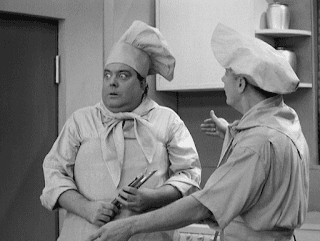Howdy, campers! Camp YesterYear is officially open for business!
We're starting here in July, after the holiday, because where I grew up, school was in session until June 15th or even as late as the 20th. You'd then have a week or two to relax, and the summer would get going after the 4th of July holiday weekend! I know it's vastly different in other parts of the country, but here in YesterYear-land, camp is officially in session from now until Labor Day.
From now till then, you'll see new summer-themed posts on Monday and reposts of old summer content on Friday mornings. I enjoyed running the Camp YesterYear theme during the last two summers, so I thought I'd bring it back again. This year starts with another summer camp story that you'll see this coming Monday morning!
I was always told in school that summer vacations were due to our country's past farming society, where kids would be let out to help work on the family farm. That didn't make sense to me since harvest season is in the fall, so I looked a little deeper into it.
It turns out that rural students spent much less time in class than their urban counterparts. Typically, the summer and winter terms were short due to the labor-intensive periods on the farm in the spring and fall. In urban schools during the same time period, students weren't bound by the demands of a farm, so schooling was typically year-round.
By the 19th century, schools pushed to standardize calendars. Prior to the standardization, New York City schools had 230 to 248 days of school per year in 1840. Today, it averages about 180 days.
So, how did we end up with summer vacation?
Urban education departments tended to have more money (and political influence), and their desires won out over those of rural communities.
For the city schools, summertime was the season with the least attendance due to cooling considerations. Some families would flee the city during the hot summer months to cooler climates, and the schools would close because nobody was coming anyway, especially after travel became even more affordable through trains and busses (Go Greyhound!)
There was also an urban legend in the education system at the time that overusing your brain was bad for you, similar to pushing a muscle too hard. Schools were eager to give the students (and teachers) an extended break to "cool off" their brains.
In the end? Schools wanted to give children time off to recharge their brains, and summer happened to be the most convenient time for the school districts with the most money and influence.







.png)





Comments
Wow. That’s a lot of interesting information I didn’t know. I knew the basics (that summer break had something to do with farming), but all the details you provided are new to me.
ReplyDeleteI found the part about standardized school calendars a little ironic, because where I live the school year starts way earlier than the rest of the country. When I was growing up, I think it was the same as you guys - we got out some time in June, then started again after Labor Day in early September. But somewhere between when I graduated high school and when I started teaching (about a 15 year gap - I did construction work for a while) they changed it so that we get out in late May (sometimes early June) and come back in early August (sometimes late July!!!)… that math doesn’t add up to me - I swear we lost a couple weeks of summer.
Anyway, very interesting article (as always). This one hit kinda close to home since I’m still in school… as a teacher with a shorter summer break than the rest of the country, apparently. I can’t really complain, though - back when I had a real job, I usually didn’t miss work unless I had a kid being born… then I took a week off.
Also, special shout out to the follow.it guy. I used to miss these sneaky Friday posts, but got the notification about this one in my email this morning. Very convenient!